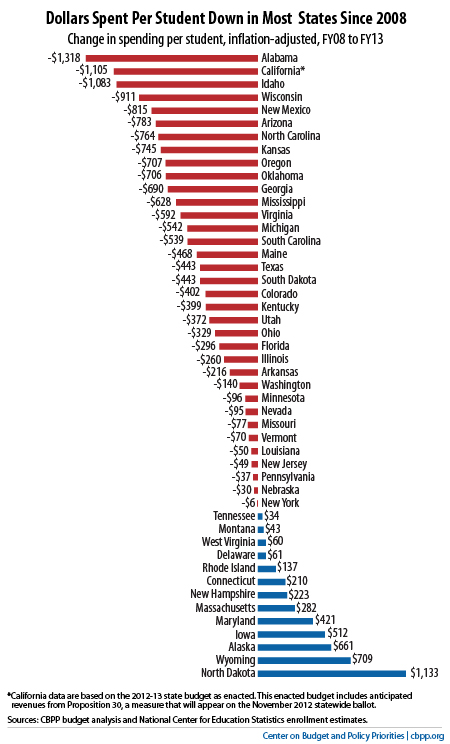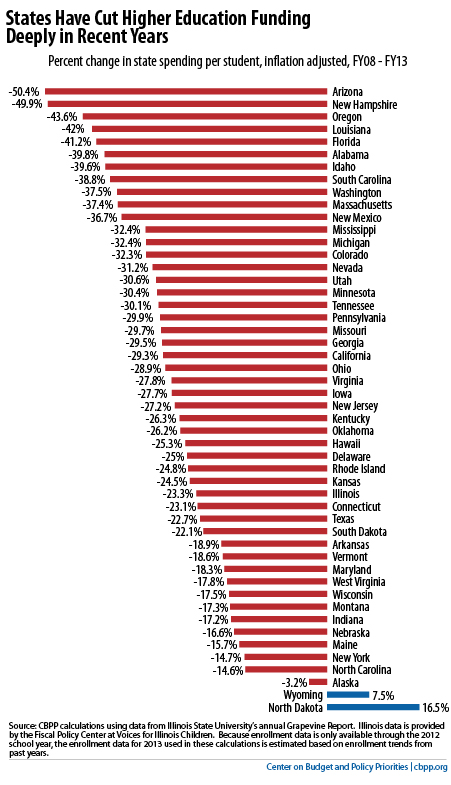Relevant to our discussion of rural economic development, Senator Stan Adelstein notes that "great schools are the most important economic development program...."
Three charts from the Center on Budget and Policy Priorities show that much of the nation is failing to follow Senator Adelstein's advice. 35 states are spending less per student on K-12 education than they did before the recession:
48 states have cut per-student spending on higher education since 2008:
To make up the difference, South Dakota university students will pay 4.4% more in tuition next school year, making it more expensive for them to explore different careers and saddling them with more debt that will make it harder for them to take their time and choose the jobs best suited to their talents and temperaments.
When darn near every policymaker and businessperson says that a key solution to economic trouble is a better educated workforce, most states are pulling back on their investment in their first economic development responsibility. Somehow I don't think any amount of corporate welfare is going to make up for this failure of foresight.



The South Dakota GOP likes picking winners and losers.
Let's see who's losing:
K-12 Students
College students
Faculty
Future employers
The elderly
The uninsured
The sick
The less advantaged
Teachers
State employees
Care providers
Parents
Small family farms
Abused animals
County commissioners
Winners:
Cronies of the GOP (Hi Lucas!)
Foreign dairies
The NRA
ALEC and their corporate funders
Who else can we add to the list?
Wyoming's earth hater governor is on full whine as his red moocher state is poised to lose mineral lease proceeds as the result of sequestration: they currently reap half of all awards.
Someone **cough**poster known as taxpayer**cough** is not keeping on his/her propaganda.
According to the Tax Foundation, yesterday was Tax Freedom day for South Dakota, so perhaps s/he is hungover from celebrating.
The Tax Foundation claims "South Dakota's 2010 tax burden of 7.58% ranks 2nd lowest out of 50 states, and is below the national average of 9.9%." The state is consistent too: "South Dakota ranks 2nd in the Tax Foundation's State Business Tax Climate Index." I keep hearing that those low taxes are going to attract jobs and wealth untold that will trickle down to all of the state's residents. (I have been waiting for hard evidence of that trickledown effect, but haven't seen any.)
http://taxfoundation.org/state-tax-climate/south-dakota
In other words, have oil will spend.... And having the Ivy League corridor in your backyard doesn't hurt either.....well, sometimes.....
Wyoming and North Dakota are obviously on the right track, if government money and spending constitute the sole indicators of a society's success.
Wyoming and North Dakota are proof of what government funds should be spent on - given the capability.
Wyoming can afford it because they have 1 state university serving nearly a similar population as South Dakota. Wyoming doesn't fritter away millions on redundant university administrivia. Wyoming's educational investments are often targeted supporting entrepreneurial spin-offs directly or indirectly from the university.
But don't get carried away with Wyoming because they are not investing in their university and spin-off businesses from a position of strength. Wyoming is among the nation's leading states for out-migration.
http://www.atlasvanlines.com/infographics/2012-migration-patterns/
One would think that the faux republicans on the SD Board of Regents would CUT expenses and CUT government instead of RAISING taxes (tuition and fees on students and their parents). THEY obviously didn't get the republican's memo of fiscal conservatism and "right-sizing" government. Since they have not and are not then another alternative is that perhaps, perhaps not, we should follow the money in an effort to discern possible motivations. You can bet that none of the regents manage their businesses with anything like the overhead found in SD's universities.